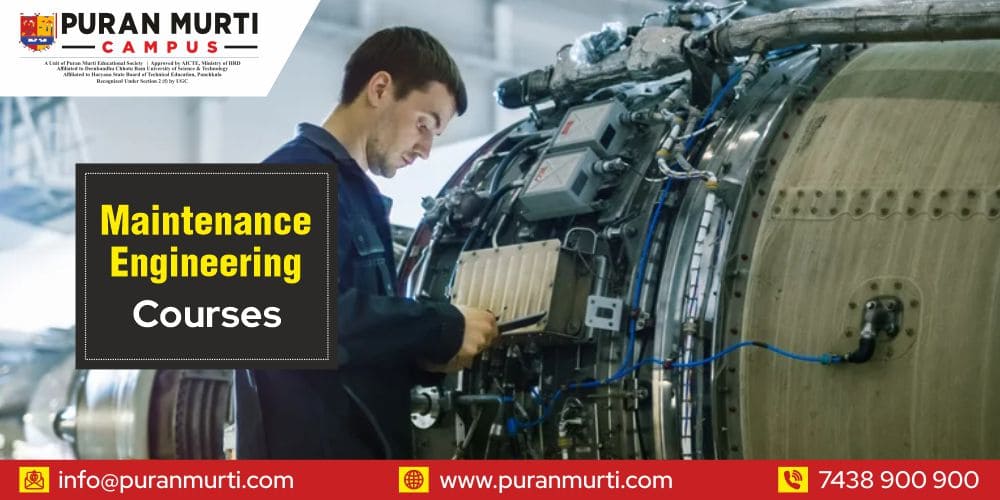About Maintenance Engineering Courses
Posted on : 13 June, 2025 2:44 pm
Have you ever wondered who makes machines in factories, planes, power plants, or even hospitals function smoothly without any surprise breakdowns? Well, the secret lies with maintenance engineers — industry’s unsung heroes. You are probably one of those who is passionate about machines, enjoys technical problem-solving, and aims for a secure job with great demand, and then Maintenance Engineering Courses could be just the right choice for you.
In this blog, we will guide you through what these courses are, who needs to take them, what you will learn, and the job opportunities they open up.
🔧 What is Maintenance Engineering?
Maintenance Engineering is a field of engineering that deals with maintaining machines and equipment in optimal working condition. It encompasses preventive maintenance, fault repair, and making sure operations go smoothly with little downtime.
Think of it this way — industries would experience expensive shutdowns, de lays in production, and safety hazards without maintenance engineers. That is why businesses in manufacturing, aerospace, oil & gas, rail, and power plants go out of their way to look for professionals with training in this sector.
🎓 What Are Maintenance Engineering Courses?
Maintenance Engineering Courses are advanced courses with the purpose of training students and professionals on how to inspect, troubleshoot, maintain, and repair industrial equipment and systems.
These courses are available at various levels:
-
Diploma Courses (1–3 years)
-
B.Tech / B.E. in Maintenance or Mechanical Engineering (4 years)
-
Postgraduate Programs (M.Tech, PG Diploma, etc.)
-
Short-Term Certification Courses (1 week to 6 months)
📚 What Will You Learn?
Based on the level of the course, you’ll be studying the following topics:
-
Fundamentals of mechanical and electrical systems
-
Preventive and predictive maintenance
-
Condition monitoring methods
-
Industrial safety and reliability
-
Maintenance planning and scheduling
-
Vibration analysis and lubrication management
-
Computerized Maintenance Management Systems (CMMS)
Few advanced courses also cover subjects such as IoT in maintenance, automation, and smart factory systems.
🧑🏫 Who Can Take Maintenance Engineering Courses?
They are best suited for:
-
Students interested in mechanical or industrial systems
-
Diploma or ITI holders who seek upskilling
-
Working engineers or technical professionals
-
Fresh graduates who seek job-oriented technical training
If you like working with your hands, fixing things in the real world, and have a desire for a pragmatic career, then this career path provides long-term job security and stability.
💼 Career Prospects After Maintenance Engineering Courses
There are plenty of career choices after studying maintenance engineering. Business sectors from all over the world depend on efficient maintenance experts to ensure that things keep moving.
Common Job Roles:
-
Maintenance Engineer
-
Plant Maintenance Supervisor
-
Reliability Engineer
-
Maintenance Planner
-
Equipment Technician
-
Service Engineer
Top Industries Hiring:
-
Manufacturing & Production
-
Oil & Gas
-
Power & Energy
-
Railways & Aviation
-
FMCG & Chemical Industries
-
Infrastructure & Construction
Salary Overview:
-
Entry-level: ₹2.5 to ₹4 LPA
-
With experience: ₹5 to ₹10+ LPA
-
Abroad (especially in the Middle East): ₹12+ LPA or more
🏫 Top Institutes that provide Maintenance Engineering Courses
Some of the top choices in India:
-
Puran Murti Vidyapeeth – Provides practical-focused technical and engineering courses with placement assistance
-
Indian Institutes of Technology (IITs) – For advanced courses and research
-
National Institutes of Technology (NITs)
-
Government Polytechnics and Private Colleges
-
Online sites such as NPTEL, Coursera, and Skill-Lync for certification
📌 Tip: Always opt for an institute that provides real-world exposure through labs, workshops, and industry tie-ups.
🌐 The Future of Maintenance Engineering
With the advent of Industry 4.0, the work of maintenance engineers is changing. Smart sensors, AI, and machine learning are now being employed by companies to predict equipment failure before it occurs.
That creates a demand for professionals who are not only skilled in hands-on maintenance but also in new technologies. It is the perfect time to enter the profession and ride the growth curve.
✅ Conclusion
To sum it up:
-
Maintenance Engineering Courses provide the skills to maintain and manage industrial equipment effectively.
-
They are perfect for technophiles who seek hands-on, high-demand careers.
-
From diploma to advanced certification, there’s a course to suit all levels.
-
Job prospects are aplenty — both domestic and international.
Need a course that blends technical expertise, practical application, and job security? Maintenance Engineering is a solid and pragmatic option.
💬 Considering taking up a Maintenance Engineering Course? Check out the choices at Puran Murti Vidyapeeth or consult with our advisors for the best advice.

